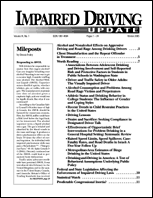Why Sobriety Checkpoints Are Not Widely Adopted as an Enforcement Strategy in the United States
Author: James C. Fell.; Susan A. Ferguson.; Allan F. Williams.; Michele Fields.
Source: Volume 06, Number 01, Winter 2002 , pp.3-5(3)

< previous article |next article > |return to table of contents
Abstract:
Sobriety checkpoints have been used by police in the United States for at least the past two decades to enforce impaired driving laws. Research has indicated that sobriety checkpoints are effective in reducing drinking and driving and alcohol- related fatal crashes. Despite this evidence, many police agencies have been unenthusiastic about using checkpoints. This article reports on a study conducted in June 2000 by the Pacific Institute for Research and Evaluation and the Insurance Institute for Highway Safety, with the cooperation of the National Association of Governors’ Highway Safety Representatives (NAGHSR), examining the results of the use of sobriety checkpoints. Information was collected from all 50 states plus the District of Columbia on the use of sobriety checkpoints. Thirty seven states reported conducting sobriety checkpoints at least once or twice during the year. Only 11 states reported that checkpoints were conducted on a weekly basis. Thirteen states do not conduct checkpoints either because of legal or policy issues.Keywords: National Association of Governors’ Highway Safety Representatives (NAGHSR); Insurance Institute for Highway Safety;
Affiliations:
1: Pacific Institute for Research and Evaluation (PIRE); 2: Insurance Institute for Highway Safety; 3: Insurance Institute for Highway Safety; 4: Insurance Institute for Highway Safety.